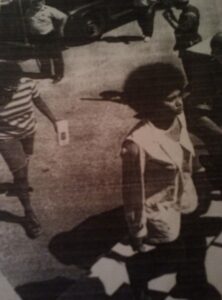
By Serena Edwards and Ezae Darby
The Black Creatives Collective at Brooklyn College, Black Student Union (BSU), Puerto Rican Alliance (PRA), and the BC Film Society held an event on Thursday, March 27 with former Black Panther Party member, Rev. Dr. Sheila Glenn, as she came to shed some light on her work with the political organization.
She began by discussing her thoughts on modern-day activism and if she recognized any organizations that possess the same raw presence and influence as the Black Panther Party themselves.
“There’s no nobody really standing up, you know, and putting their fist in the air and saying we had enough. You know, we need to change,” Glenn told The Vanguard.
She went on to discuss, the effects of the Vietnam War and its effect on communities in the U.S.
“The Vietnam War had just ended leaving soldiers with undiagnosed PTSD. Our husbands, brothers, and cousins were coming back completely traumatized. We knew nothing about PTSD at that time, so they were just back home with no treatment,” said Glenn.
She went on to explain how this period of unfortunate events served as the perfect time for the world to gain a new sense of hope. “They had assassinated Martin, Malcolm, Kennedy […] They (BPP) came out with their guns and they were talking about power to the people and it resonated. And it just didn’t resonated to Black people, it resonated to the country”.
Glenn then dived into how she became a Black Panther member herself, citing her own troubling time as a youth as a key part of her story. Prior to joining the party, she experienced her own issues with substance abuse as a young woman and witnessed the devastating effects of drug use in her community. This served as the main motivation behind her departure.

“I went to Massachusetts to stay with my aunt because all of my friends were falling from heroin. They were falling like flies, and I didn’t want to be one of them,” stated Glenn. Eventually, she found herself in New Bedford, Massachusetts, where she became an important member of the party’s chapter in that particular city.
Glenn explained how she did not purposefully join the Black Panthers and only became involved after getting caught up in the middle of a riot.
“I didn’t volunteer to be a Black Panther. I was in the wrong place at the wrong time, I got arrested. We found out that we were arrested for conspiracy to commit anarchy, conspiracy to incite a riot and unlawful assembly. The Black Panther Party bailed me out and that’s how I became a member.”
Glenn then spoke about her role in the organization, where she was just 18 years old at the time. “I was a political education officer and financial officer. I was only 18 years old, but I was smart you know, I was so stupid and I could read the literature, even though I didn’t comprehend at the time that it was about communism,” said Glenn.
She also spoke on the inconsistency in retaliation from the government between the Black Panther Party in comparison to other organizations like the Nation of Islam.
“They were selling papers and they were saying that the white man was the devil […] but they weren’t getting killed. [BPP] were getting killed because they were talking about overthrowing the government and changing the government from a capitalistic society to one of socialists or on a path toward communism,” she stated.
Still, Glenn remained grateful for her experience and the fact that she is a survivor of that violent time period.
Glenn now serves as an adjust professor at Mercy College where she teaches a course on substance use. She also currently maintains the position of Assistant Pastor at Friendship Methodist Church in Brooklyn, NY.
For context on the organization itself, The Black Panther Party for Self-Defense, which originated in Oakland, California, was a militant group formed to patrol and protect the Black community from police brutality. Founded in 1966 by Oakland residents, Bobby Seale and Huey P. Newton, the party surged in popularity over the years and became known as one of the most influential groups in American history.
The organization was able to establish different chapters, or branches, around the country to effectively serve the community by providing various services including children and youth services.
The party further aided the community in their struggles through the creation of their Ten-Point Program, a declaration with the intent to turn their needs into a reality. The document listed the demands of the African-American community in Chicago and included the need for adequate housing, full employment, and an immediate end to police brutality.
Most notably, the film “Judas and The Black Messiah”, which premiered in 2021, is a period-piece about the Black Panther Party, most notably the infiltration and murder of a ton of the party’s leading members. The film perfectly captured the heart and soul of the party and it’s mission to achieve piece.
The film, which was screened during this evening’s event, focused on the events leading up to the murder of the Chicago Black Panther Party Deputy Chairman, Fred Hampton. Hampton is played by British actor, Daniel Kaluuya, who is best known for his roles in blockbuster, black-led films like “Get Out” and “Black Panther”.
Despite his unfortunate death at the age of 21, the young revolutionary left behind a remarkable legacy, having brought together many different political organizations across Chicago.
To end this evening, Glenn provided the audience with some words of inspiration: “You can’t be afraid to speak out […] just show up, the more bodies we have, the more fearful we are. Keep up the fight, keep up the good fight, getting in good trouble like my man said, and don’t give up. We came a long way. But we still have a long way to go.”
